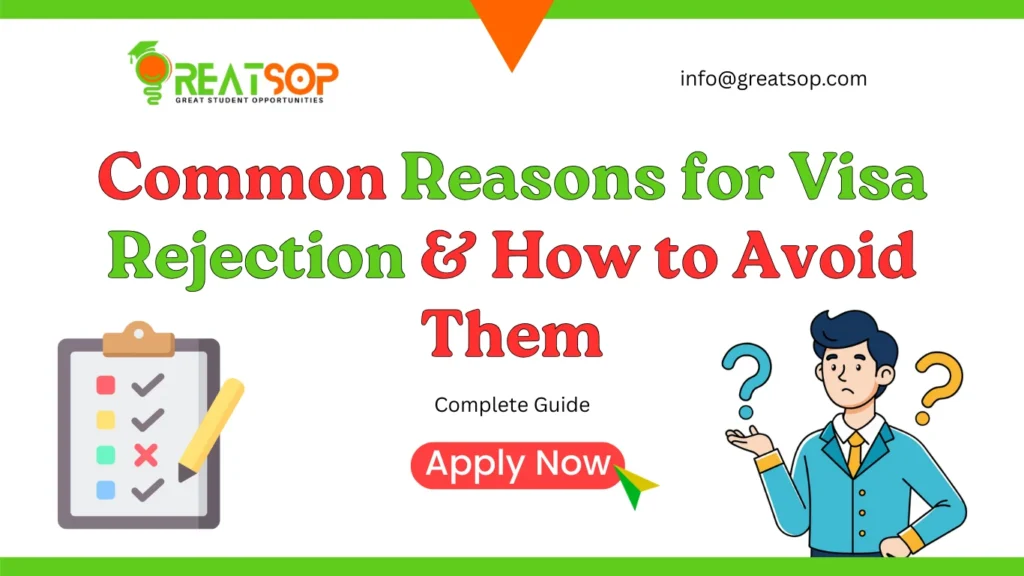Securing a visa is an exciting step toward studying or settling abroad, but many applicants face rejection simply due to avoidable mistakes. Understanding the common reasons for visa rejection can help you prepare better and improve your chances of approval. Whether you’re applying for a student visa, work permit, or visitor visa, knowing what immigration officers look for and where applicants often go wrong is essential.
Let’s explore the most frequent causes of visa refusal and practical ways to overcome them.
1. Incomplete or Incorrect Documentation
One of the biggest reasons for visa refusal is missing, inaccurate, or inconsistent information in your application. Even a small error such as mismatched details between your passport and application form can raise red flags.
How to avoid this:
- Double-check all forms before submission.
- Submit all required documents as per the official checklist.
- Ensure consistency in names, dates, and financial records.
2. Insufficient Financial Proof
Visa officers need assurance that you can financially support yourself abroad. If your bank statements or sponsorship letters don’t meet the required funds, your visa may be denied.
How to avoid this:
- Maintain the required minimum funds in your account for the specified duration.
- Provide clear evidence of income or sponsorship.
- Submit properly stamped and updated financial documents.
Also Check: Step-by-Step Guide to Studying Abroad – Application & Visa
3. Lack of Strong Ties to Home Country
If the visa officer believes you may not return to your home country after your stay, your application can be rejected. They look for strong family, career, or property connections that prove you intend to return.
How to avoid this:
- Provide proof of employment, family ties, or property ownership.
- Clearly explain your post-study or post-visit plans.
- Include documents that highlight your long-term commitments at home.
4. Poor Academic or Travel History
A weak academic record or a history of overstaying visas in other countries may negatively affect your chances. Immigration officers assess your ability to succeed abroad and follow legal guidelines.
How to avoid this:
- Be transparent about your academic or travel history.
- Provide a strong statement of purpose (SOP) explaining your goals.
- If you had past visa refusals, address them honestly and show how you improved your profile.
5. Inconsistent Purpose of Visit
If your application fails to clearly justify why you want to travel abroad, or your documents contradict your stated purpose, rejection becomes more likely.
How to avoid this:
- Write a clear and convincing statement of purpose.
- Make sure all supporting documents align with your stated intent.
- Avoid vague explanations and focus on specific goals.
6. Missing or Invalid Health & Character Certificates
Many countries require medical tests and police clearance certificates. Missing these or submitting outdated versions can lead to delays or outright refusal.
How to avoid this:
- Get medical tests and police verification done from approved centers.
- Ensure all certificates are valid and up-to-date.
- Submit them within the stipulated deadlines.
Also Check: Get Your Netherlands Student Visa: Step-by-Step Guide
Do’s & Don’ts to Improve Visa Approval Chances
Do’s:
- Follow official guidelines and checklists strictly.
- Be truthful and consistent across all documents.
- Seek guidance from credible visa consultants if needed.
Don’ts:
- Don’t provide fake or misleading information.
- Don’t wait until the last minute to gather documents.
- Don’t ignore country-specific visa rules and requirements.
Conclusion:
Facing a visa rejection can be disheartening, but it’s often preventable. By understanding the common reasons for visa rejection and taking proactive steps to address them, you can strengthen your application and boost your chances of success. Stay prepared, stay transparent, and seek professional guidance when needed your dream of studying or settling abroad is within reach.




